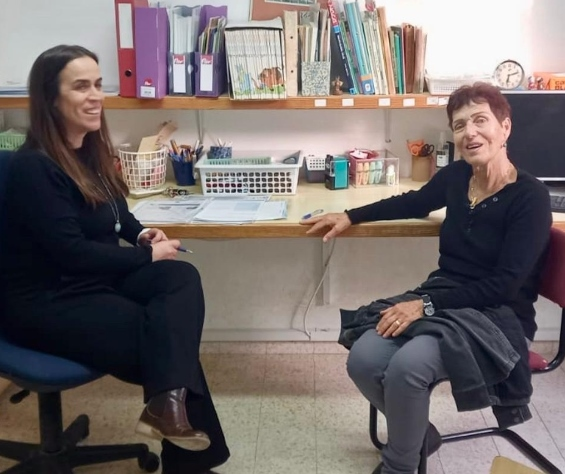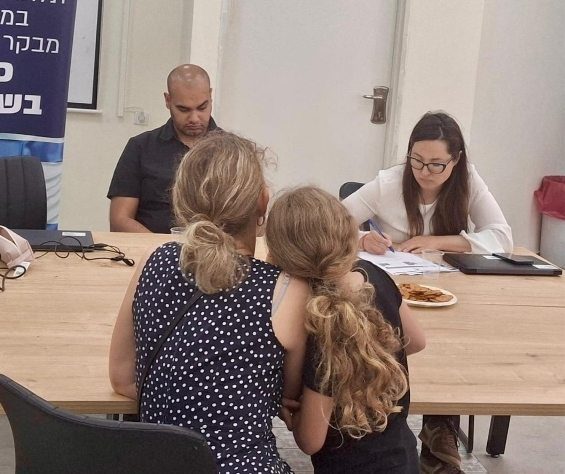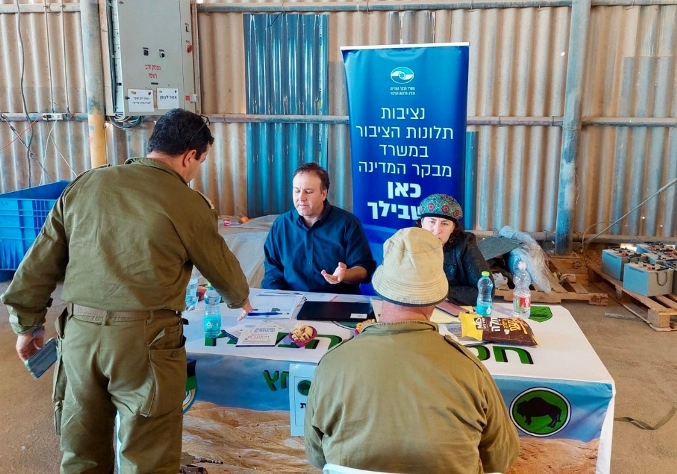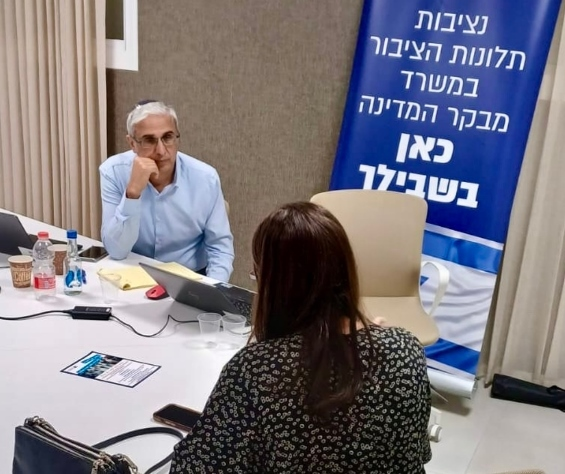The employees of the Ombudsman's Office support evacuees who have returned to their homes, as well as other victims of the war, in navigating bureaucratic challenges. Attorney Maya Halevi, Director of the Ombudsman's regional office in Beer Sheva, reflects on the associated challenges and instances of optimism
A gray concrete pathway traverses the verdant expanses of Kibbutz Magen. It is midday, and the tranquility is interrupted only by the chirping of birds. This idyllic setting is a stark contrast to the turmoil experienced during the Simchat Torah massacre when this peaceful kibbutz was transformed into a battlefield.
On October 7, 2023, approximately 20 Hamas terrorists infiltrated the kibbutz, situated in proximity to the Gaza border, after having breached its western fence. The kibbutz's rapid response team engaged in a protracted battle with the assailants, inflicting significant casualties upon them and ultimately repelling the intruders. However, this valiant effort exacted a heavy toll, as two members of the rapid response team, Avi Fleischer and Ofir Yaron of blessed memory, were killed in the encounter.
The following day, terrorists attempted another incursion into the kibbutz, which was successfully thwarted by Israeli Defense Forces (IDF) fighters. On October 9, 2023, subsequent to the second infiltration attempt, the residents of Kibbutz Magen were evacuated to accommodations at a hotel situated along the Dead Sea. There, at the lowest point on Earth, residents evacuated from other communities surrounding Gaza, as well as from Sderot and Ashkelon, sought refuge.
"We met residents in need of assistance and guidance"
In the immediate aftermath of the tragedy, during the initial days and weeks, when hundreds of thousands of residents, who had been hastily evacuated from their residences, required assistance in asserting their rights, the Office of the Israel Ombudsman within the Office of the State Comptroller was there for them. Under the leadership of State Comptroller and Ombudsman Matanyahu Englman, Ombudsman personnel went to the hotels housing the evacuees, to impacted communities and to areas where reserve soldiers were concentrated. Within the first week of the war, a 24-hour hotline was established and operated around the clock by the Ombudsman, serving those affected by the state of emergency.
Attorney Maya Halevi, Director of the Ombudsman's regional office in Beer Sheva and Division Deputy Director within the Ombudsman's office recalls: "It was evident that the establishment of field posts was imperative to ensure that no request for assistance was overlooked. We met with residents in need of support and guidance. We assisted them in completing forms and in resolving various bureaucratic issues. Amidst the prevailing uncertainty, we were compelled to keep learning on a daily basis about their entitlements. Occasionally, our support manifested in merely being present and providing a listening ear".
Which case stood out for you in particular?
"I received a complaint via our hotline concerning a divorced couple. The man resided in an evacuated settlement and was therefore eligible for a housing grant, while the woman remained in her home. Their children, under joint custody, were entitled to the grant through their father - however, the National Insurance Institute website did not facilitate a separate application for the children apart from their mother who was not entitled. After an inquiry from the Ombudsman's office, the National Insurance Institute implemented a technical solution that enabled this family, along with others in similar circumstances, to exercise their right to the grant".
Restoring Trust
Numerous residents evacuated from the southern and northern communities have since either returned to their homes or are adjusting to temporary housing arrangements in alternative communities. However, as of today, more than a year and a half after the outbreak of the war on October 7th, they continue to encounter arduous bureaucratic challenges.
Consequently, in recent months, the Ombudsman's personnel have re-entered the field, establishing posts nationwide for the purpose of collecting complaints from those unable to access assistance from public entities or who are dissatisfied with the support received. To facilitate this initiative, local authorities in both the northern and southern regions have been systematically mapped, and a dedicated team of Ombudsman personnel have been assigned to each local authority with the task of maintaining ongoing communication and establishing field posts within the authority's jurisdiction. Furthermore, public reception centers have been inaugurated at rehabilitation facilities and 'Beit Halochem' facilities (for wounded veterans), to assist soldiers injured during the war. To date, approximately 50 such centers have been established across the country.
During a field visit, attorneys Halevi and Yaakov Gonchel visited Kibbutz Magen to engage with the kibbutz members. "We not only clarify their rights but also endeavor to provide immediate assistance in instances of delays or insufficient responses from various institutions", states Halevi.
She asserts that working in the field necessitates not only professional expertise but also substantial empathy and active listening: "Our capacity to engage directly, observe their circumstances firsthand, and provide real-time solutions – this is what distinguishes us".
Complaint investigators currently fulfill a crucial function, aiding in the restoration of complainants’ trust in the public services that have failed them during critical periods. Through their efforts, they emphasize to public bodies that each complaint is representative of an individual, thereby advancing the development of a more compassionate and empathetic public service.
Is there a distinction between the concerns that preoccupied evacuees at the war's outset and the issues they confront today?
"Indeed. At the onset of the war, evacuees sought assistance in asserting their fundamental rights and voiced grievances concerning delays in access to essential public services. Presently, an increase in complaints has been observed, primarily related to more fundamental issues arising from the protraction of the war, such as payment of grants. For instance, a single mother from one of the kibbutzim who returned home expressed her dissatisfaction regarding her entitlement to a grant from the Tekuma Directorate for the purpose of equipment, which she deemed inadequate compared to that received by dual-parent families. She articulated: 'I am not purchasing half a living room, but an entire living room, like every family – so why am I receiving less money?'"
The Human Touch
Attorney Halevi, who started her career as a legal intern at the Jerusalem District Court, joined the Ombudsman's office in 2005. Since that time, she has remained connected to the field, primarily in the southern region served by the Ombudsman's office in Beer Sheva. "The personal connection with residents, the ability to support them, and the aspiration to effect change – that is what empowers me".
This task necessitates not merely technical solutions but also flexibility and the capacity to navigate the cultural characteristics of the diverse populations residing in the southern region, including recent immigrants and individuals from the Bedouin community. The Ombudsman's office provides services to applicants in multiple languages, including Hebrew, Arabic, Russian, Amharic, and English.
What challenges do you encounter in your work?
"People often do not immediately comprehend that we function as an independent, non-governmental entity, leading to initial doubts regarding the Ombudsman's capacity to assist them. We explain what we can do and give examples of complaints we have successfully addressed. Building trust can require time, but it is achievable. Even in instances where we fail to reach a resolution, the complainant perceives our efforts to assist him, and that fact gives him a positive feeling".
The Ombudsman's outreach in the field, initiated at the war's outbreak and renewed in November 2024, is projected to expand over the forthcoming year.
"We will concentrate on supporting war victims – evacuees, reservists, the injured, and bereaved families", explains Halevi. "We will continue to be there for them, in the field, facilitating the submission of complaints within their own neighborhoods".
The Ombudsman's Office operates during routine times to assist not only victims of the Iron Sword War but also any individual who submits a complaint regarding public institutions. Complaints can be lodged with the Ombudsman through a variety of channels outlined on the website.















